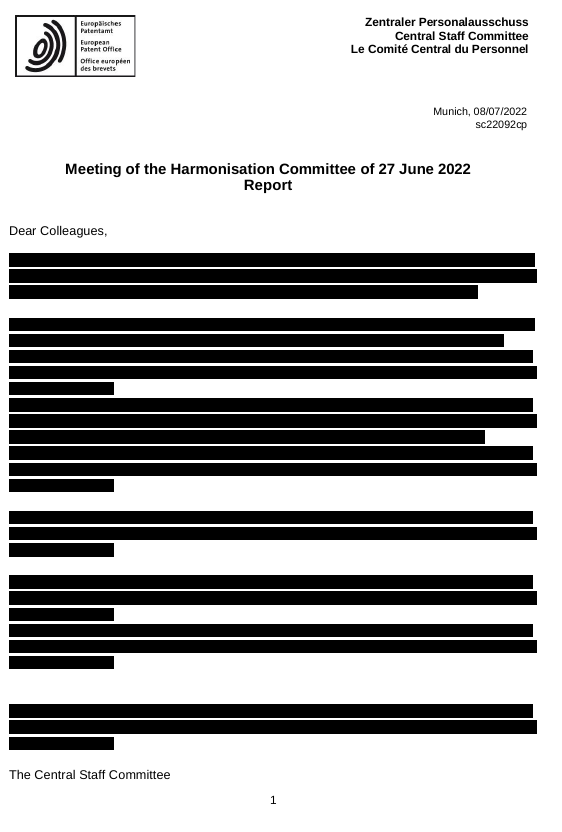
0ec5420818157c7113ab4c89811b739c
New Levels of Censorship at EPO
Creative Commons Attribution-No Derivative Works 4.0
THE EPO bribes media and academia and today it openly bragged about it. (warning: epo.org link)
"What does it mean for the media when staff representation at the EPO is also being gagged, preventing media from even finding out what's going on inside the EPO?"That's the subject of the video above. Based on publications in circulation this week, the censorship has reached new heights. As far as we can recall, even Benoît Battistelli did not do this and this is what António Campinos resorts to after securing (buying) another term.
This is what a report now looks like (just to make a point):

The Central Staff Committee (CSC) posts an empty letter in protest
We note that the Office allows the CSC to appoint an observer in the Harmonisation Committee (HC) – even though this is not foreseen in the regulations – to contribute to a transparent rewards exercise. To ensure this transparency, in your capacity of observer, you were invited to attend the HC and were given access to the same confidential information the HC’s statutory members have.
As an observer to the HC, you are also free to report at any time in general terms to the CSC what you observed, including by raising any issue of a general nature. Nevertheless, this capacity of observer does not allow you to share any confidential documents (which served as a basis for the discussion) nor any confidential information with anyone outside the HC (incl. the CSC), neither before nor after the President has taken a decision. In that respect, the obligation of confidentiality applicable to the HC’s statutory members, applies equally to you. Finally, as specifically concerns the rewards statistics report, it is noted that the confidentiality thereof was duly specified beforehand, and not challenged by you either before or during the meeting. This report can therefore not be shared with the CSC.
European Patent Office 80298 Munich Germany
Central Staff Committee Comité central du personnel Zentraler Personalausschuss
centralSTCOM@epo.org
Reference: sc22097cl Date: 14.07.2022
European Patent Office | 80298 MUNICH | GERMANY Mr António Campinos President of the EPO
By email
OPEN LETTER
Information sharing within Staff Representation
Dear Mr President,
The CSC has been permitted to appoint a single observer to the Harmonisation Committee. In advance of the last meeting of this Committee, our observer was provided with the relevant documentation, along with a statement explicitly forbidding the sharing of the document with the other members of the CSC. In reply to a query from our observer, your services reiterated their position, and stated that the “role [of] an observer is to ensure transparency but does not allow [the observer] to disclose any documents or discussions from the meeting”, and further that the observer is “free to report at any time in general terms to the CSC what [was] observed, including by raising any issue of a general nature”.
In light of this exchange we note the following:
● We disagree that, under the restrictions set out, the observer is able to ensure any transparency in the procedure at all, since the observer is obstructed from effectively informing the CSC. ● We question what information would be considered “general” by the administration. ● We object to our observer being put in the difficult position of potentially disclosing information that the administration later deems to not fit the “general” requirement, and being sanctioned for it.
● We have not been given any justification as to why the documents are not suitable to be shared among the elected staff representatives, especially since they contain merely anonymised statistics rather than any personal or identifying information of individuals.
We are of the opinion that the role of the observer is to report to the CSC the events of the Harmonisation Committee meetings. To effectively do so, the observer must not be impeded with undue barriers. Should any irregularities be identified (for example, unaccounted for funds are identified or disproportionately large bonuses are awarded to a particular subset of staff) the CSC can take appropriate action. Alone, the observer is powerless to act on any findings.
Therefore, we request that the decision to disallow a nominated staff representative to share documents and details of discussions held in said meeting with the rest of the CSC be reconsidered.
Yours sincerely,
Michael Sampels Acting Chairman of the Central Staff Committee